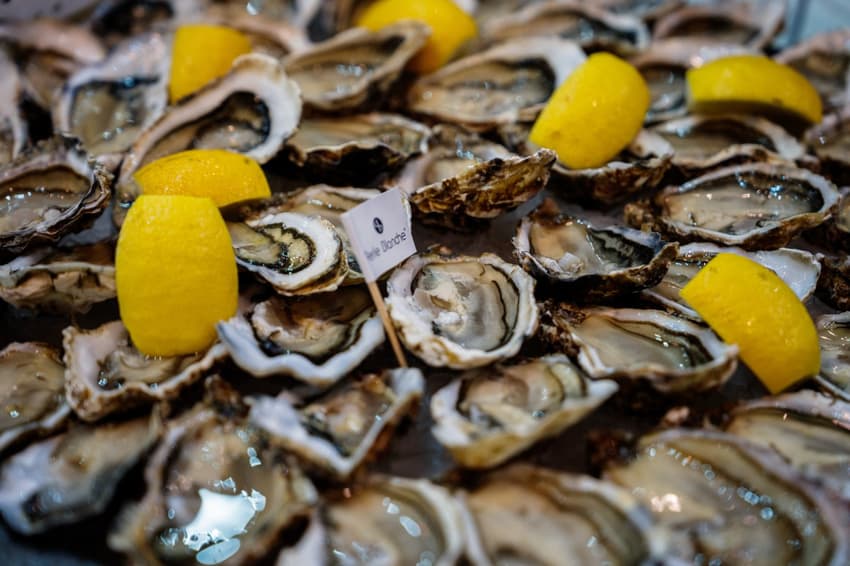How safe are the oysters you will eat in France this Christmas?

Oysters are a staple of French dining over the festive period. But after cases of food poisoning and a ban on sales in the Loire-Atlantique department, some are questioning their safety.
Often served with a squeeze of lemon, a shallot vinaigrette or simply raw and ungarnished, oysters are a delicacy adored by the French during the festive period - especially during the Reveillon de Noël banquet on the evening of December 24th. The tradition dates all the way back to the Middle Ages.
There are more than 200 oyster farms in France and generate more than half their annuel income over Christmas.
But a recent case of mass food poisoning has rocked consumer confidence in some parts of the country.
READ ALSO The shellfish that's a festive must-have
Departmental authorities in the Loire-Atlantique region have temporarily banned the sale of oysters after around 40 people fell ill at during a special feast organised for local firefighters on December 9th. Some of the attendees had to go to hospital and the regional health authority opened an investigation.
A local oyster farmer voiced his frustration with the decision to France Bleu. "It is more than a tough blow. It is like being stabbed," he said.
Some local producers say they are likely to lose out on tens of thousands of euros in revenue.
What are the dangers?
Many people believe that oysters are best served raw - as is the tradition in France.
But eating them this way always carries some degree of risk. The Norovirus and vibrio bacteria are can cause serious illness and are often found in shellfish that has come into contact with untreated sewage.
Heavy rains along the West Coast of France this year have likely seen increased amounts of wastewater flow into the sea, increasing the risk of contamination.
Those who are immunosuppressed, have pre-existing co-morbidities, have had recent stomach surgery, take medicine to lower stomach acidity or are over-65 are at a higher risk.
So should I avoid raw oysters?
While there is no guarantee that raw oysters are 100 percent safe to eat, French authorities do carry out regular safety checks that limit the risk.
Much of this monitoring is carried out by the French Institute for the Exploitation of the Sea (IFREMER), which conducts analyses at least once or twice a month in oyster-producing regions along the coastline.
"This frequency [of testing] can be increased in some circumstances, notably following heavy rainfall," said microbiologist Soizick Le Guyader in an interview with BFMTV.
When contaminants are detected in significant quantities, sales are banned, as happened recently in Loire-Atlantique.
If this doesn't reassure you, then there are also plenty of other delicious dishes to savour during the festive feast.
READ ALSO The 12 dishes that make up a classic French Christmas feast
Comments
See Also
Often served with a squeeze of lemon, a shallot vinaigrette or simply raw and ungarnished, oysters are a delicacy adored by the French during the festive period - especially during the Reveillon de Noël banquet on the evening of December 24th. The tradition dates all the way back to the Middle Ages.
There are more than 200 oyster farms in France and generate more than half their annuel income over Christmas.
But a recent case of mass food poisoning has rocked consumer confidence in some parts of the country.
READ ALSO The shellfish that's a festive must-have
Departmental authorities in the Loire-Atlantique region have temporarily banned the sale of oysters after around 40 people fell ill at during a special feast organised for local firefighters on December 9th. Some of the attendees had to go to hospital and the regional health authority opened an investigation.
A local oyster farmer voiced his frustration with the decision to France Bleu. "It is more than a tough blow. It is like being stabbed," he said.
Some local producers say they are likely to lose out on tens of thousands of euros in revenue.
What are the dangers?
Many people believe that oysters are best served raw - as is the tradition in France.
But eating them this way always carries some degree of risk. The Norovirus and vibrio bacteria are can cause serious illness and are often found in shellfish that has come into contact with untreated sewage.
Heavy rains along the West Coast of France this year have likely seen increased amounts of wastewater flow into the sea, increasing the risk of contamination.
Those who are immunosuppressed, have pre-existing co-morbidities, have had recent stomach surgery, take medicine to lower stomach acidity or are over-65 are at a higher risk.
So should I avoid raw oysters?
While there is no guarantee that raw oysters are 100 percent safe to eat, French authorities do carry out regular safety checks that limit the risk.
Much of this monitoring is carried out by the French Institute for the Exploitation of the Sea (IFREMER), which conducts analyses at least once or twice a month in oyster-producing regions along the coastline.
"This frequency [of testing] can be increased in some circumstances, notably following heavy rainfall," said microbiologist Soizick Le Guyader in an interview with BFMTV.
When contaminants are detected in significant quantities, sales are banned, as happened recently in Loire-Atlantique.
If this doesn't reassure you, then there are also plenty of other delicious dishes to savour during the festive feast.
READ ALSO The 12 dishes that make up a classic French Christmas feast
Join the conversation in our comments section below. Share your own views and experience and if you have a question or suggestion for our journalists then email us at [email protected].
Please keep comments civil, constructive and on topic – and make sure to read our terms of use before getting involved.
Please log in here to leave a comment.